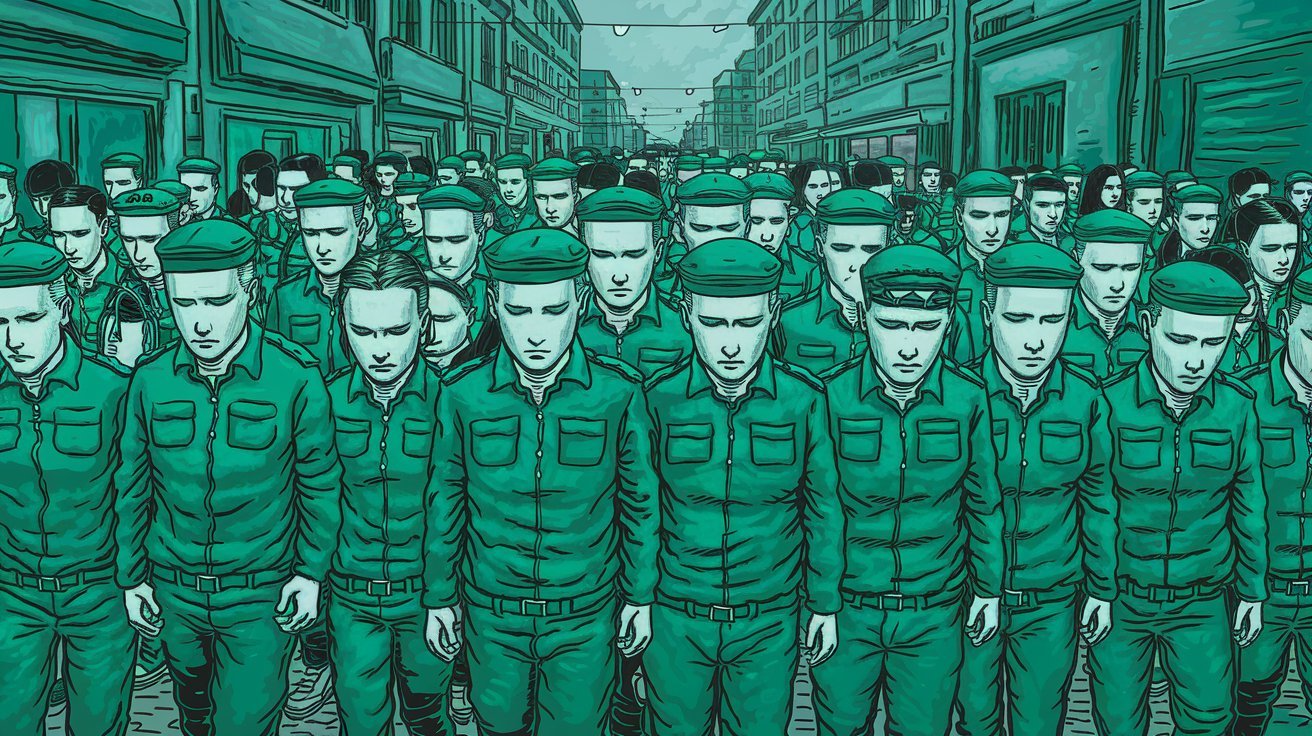In a world that seems to get more complicated by the day, we often find ourselves tempted by simple solutions. But be wary—some of these “solutions” are wolves in sheep’s clothing, designed not to enlighten, but to suppress. Allow me to introduce you to the terrible trio of intellectual control: conformism, totalitarianism, and their secret weapon, reductionist indoctrination. These three are the silent assassins of free thought, and if you’re not careful, they might just creep up on you when you least expect it.

Conformism: The Sheep in the Crowd
Let’s start with conformism, that innocuous-sounding tendency we all have to just… fit in. You’ve probably experienced this at a party, at work, or on social media. You know how it goes: you have a unique idea, but everyone else seems to agree on something else. Suddenly, you find yourself nodding along, not because you agree, but because it’s easier than standing out. That’s conformism in action.
Psychology loves to toy with this idea, and the infamous Asch experiment proved just how powerful the social pressure to conform can be. In the experiment, people knowingly gave wrong answers to simple questions just because others in the room did the same. Yes, it’s as ridiculous as it sounds—humans would rather be wrong with the crowd than right on their own. It’s like being a sheep who knows the cliff is coming but keeps following the flock because “hey, everyone else is doing it!”
Now, in small doses, conformism can be harmless. It keeps the peace at family dinners and makes sure no one wears a chicken suit to a black-tie wedding. But when it spills into politics, beliefs, and moral judgement, we’re walking a fine line. Conformism becomes the breeding ground for much darker forces, like…
Totalitarianism: The Big Bad Wolf
Totalitarianism is what happens when conformism is enforced with a sledgehammer. It’s the ultimate “my way or the highway” of political systems, where the state doesn’t just suggest you follow the rules—it mandates it with an iron fist. In a totalitarian regime, there’s no room for dissent, debate, or even mild disagreement. It’s a full-scale hijacking of the human mind.
Imagine living under a government where every aspect of your life is controlled: what you read, what you believe, even what you say to your friends in private. You don’t need to imagine it too hard; history’s given us more than enough examples. Think Nazi Germany, Stalin’s USSR, or modern-day North Korea. These regimes didn’t just want obedience; they demanded total ideological control, with no room for deviation.

At the heart of totalitarianism is a terrifying consistency. A single party, or worse, a single leader, controls all political, social, and economic life. The media is a puppet for state propaganda, and any form of individual expression is treated as a threat. Your only choice is conformity—or else. And how does the “or else” play out? Enter secret police, surveillance, and a system of fear that would make George Orwell’s 1984 seem like a children’s bedtime story.
But how do you get millions of people to accept such a system without endless rebellion? That’s where the final piece of the puzzle comes in…
Reductionist Indoctrination: Simplifying the Complex
Now, let’s talk about the silent partner in crime: reductionist indoctrination. This one’s sneaky. It’s not as overt as a totalitarian police state or as immediate as peer pressure to conform, but its effects can be just as corrosive to independent thought. Reductionist indoctrination simplifies complex problems into black-and-white answers, spoon-feeding them to the masses as “the truth.”
Here’s how it works: Imagine a regime wants to control how you think about the economy. Instead of engaging with the nuances of economic theory, they reduce the whole conversation to a simple formula: “It’s all the fault of [insert scapegoat here].” Whether that scapegoat is immigrants, the wealthy elite, or some foreign enemy, the message is the same: You don’t need to think, just believe.

The goal of reductionist indoctrination is to suppress critical thinking. Why bother analysing the complexities of a social issue when you’ve already been told who to blame? It’s a brilliant, if evil, way to maintain control. By reducing every problem to a simplistic narrative, regimes and ideologies remove the possibility of debate. After all, there’s nothing to debate if you already “know” the answer.
The technique isn’t limited to totalitarian regimes either. You’ll find it sneaking into democratic societies, too. Politicians, advertisers, and media outlets often use reductionist language to manipulate public opinion. “You’re either with us, or against us.” “This is the one true solution.” Sounds familiar, right?
The toxic trio
So, where does this leave us? Conformism, totalitarianism, and reductionist indoctrination are interconnected forces, each feeding off the other. Conformism lays the groundwork, encouraging people to follow the crowd. Totalitarianism seizes upon that instinct, demanding absolute obedience. And reductionist indoctrination oils the gears by simplifying the world into easily digestible narratives that discourage any meaningful challenge to authority.
The scary part? These forces are still very much alive today. They manifest in different forms, but the principles remain the same. Whether it’s political propaganda, social media groupthink, or sensationalist media narratives, the pressures to conform, submit, and stop thinking critically are as strong as ever.
So, next time you’re tempted to follow the crowd without questioning, or you’re drawn to an oversimplified explanation of a complex issue, take a moment to pause. Real freedom doesn’t come from fitting in or accepting easy answers—it comes from thinking critically, questioning everything, and resisting the toxic trio of intellectual control.





